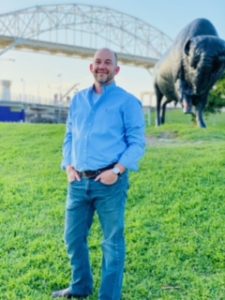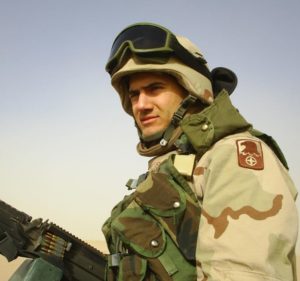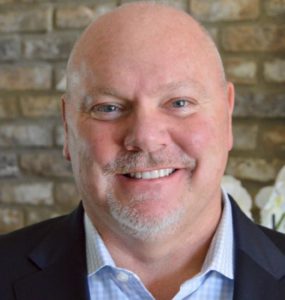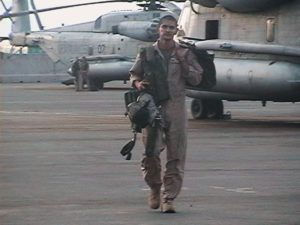From the firing line to the land of the pipeline, the wireline, and the never-ending deadline, a huge number of military veterans have found their way into the Oil Patch. In this month of celebrating Independence Day, our dependence on the military and the oil business are more apparent than ever. It’s not surprising that there’s a connection between the two.
Surveys show that one of the main things missed by those mustering out of any military branch is the camaraderie, the closeness, the complete interdependence among comrades-in-arms. In the stories that follow, we’ll read of several whose attraction to oil and gas was its feeling of cooperation and teamwork—more present here than in most other fields.
Chris Shields
Branch and Rank: Marine Corps, 8 Years, Staff Sergeant Select
Now: VP Operations, one of the founders, Standard Safety & Supply
Shields began his military career without a grand plan, or really without a plan of any sort. Shortly before high school graduation he was warned by his parents to either move beyond fast-food jobs or continue his education.
Uninterested in more schooling, Shields marched down to the Odessa mall—in what he called “an act of defiance”—and joined the Marines. Their recruiter was the only one in the office at the time.
“Thirty days later, I was gone, with no clue about the rigors of the Marine Corps.” A few weeks [[[[[[[[[[ should this say months???? ]]]]]] and one case of pneumonia later, he was trained and ready to go.
His first four years were mostly behind the scenes. Then, after being offered a large bonus, he signed on for frontline duty and spent the next four years doing four tours in Iraq.
“I was pretty much a fly-by-the-seat-of-my-pants guy,” he admitted.
His best memories were “time you spend with your guys. I made some really good friends over there that I still talk to today.” Those friends came from all walks of life, in what Shields called “a melting pot.” He earned a Purple Heart during his time in Iraq.
He’s now learned to overcome that seat-of-the-pants thinking. The military “gave me some ambition.”
Returning to civilian life, he took advantage of his G.I. bill education funding to complete a BBA in accounting and finance from UTPB in 2014.
Next, following a stint at Huntsman in Odessa, Shields was approached by Tyler Barcena with the idea that they should start a safety company. Barcena became president and CEO of the company, Standard Safety & Supply. “He’s the best salesman I ever met in my life,” Shields said.
The company opened its doors with with two employees and $14k in sales. Today it boasts 243 employees and $3.5 million a month in sales. “The camaraderie we built here mirrors my military background,” Shields noted.
Among the top military takeaways for him was orderliness. “I’m a huge chain-of-command guy here. When we have 241 people, chain of command is a huge deal. You’ve got to have boundaries, you’ve got to have people that feel empowered to do their jobs, feel empowered to make the right call, and they’ve got to be coached on the calls you want them to make.”
The Marines also taught him how to pick well, as he worked with strong and caring officers. The qualities he looks for include “a strong backbone,” and one who wants to take ownership of the job and the company. “I don’t want a guy that doesn’t look forward to Monday morning.” Blunt honesty, especially when taking responsibility, is another key.
In combat, he noted, no one can afford to say, “Today I’m only going to go half-speed.” People are depending on everyone to be fully engaged in both scenarios.
Tadd Wallace
Branch: Air Force, 173 Airborne, 6 Years, E-4 Sr. Airman
Now: CEO at Universal Chemical Solutions
Tadd Wallace grew up in a military family, his father reaching the highest enlisted rank possible. Wallace did most of his growing up at military bases in Japan.
Enlisting in the Air Force, Wallace finished basic training on September 11. Yes, that September 11. He felt privileged to have his father speak at his graduation.
After that he became part of a team out of San Antonio that was then attached to the 173rd Airborne Brigade. “We were the first team into northern Iraq.”
His daughter was 15 days old when he boarded that plane. To put it mildly, his wife encouraged him to get the job done and get home. Doing that job included receiving a commendation after a shootout with members of Saddam Hussein’s Republican Guard.
While he entered the Air Force with more purpose than some, he still says, “Without those life lessons, I wouldn’t be doing what I’m doing today.”
Lesson one would be, “It takes everybody. Relationships are the most powerful thing you’ll ever have. Because if you have the right people, you’re willing to do anything for the right people. And if you have the right people you make good decisions.” This understanding helped him attract leadership team members with decades of experience from major producers, whose knowledge and connections have greatly boosted the young company.
He also learned the value—and necessity—of taking risks. “The military taught me, hey, sometimes you’ve got to just take a job and do it.”
Risk-taking has served Wallace well in the business world. He spent about three-and-a-half years at GasFrac Energy Services, where he learned the value of that company’s knowledge of fracturing with gas instead of water. A few years later he took what he’d learned there regarding LPG fracturing, expanded on it, and started UCS. UCS uses those procedures to greatly enhance shale production beyond the 3 percent recovery rate common with water fracturing.
That gamble involved leaving a 6 figure job and investing everything he had into this company—quite a gamble in perilous times, but it has paid off for Wallace.
While these risks were not on the level of “Hey, they’re shooting at us, I’ve got to get out of this airplane,” the rewards on the business side can be greater than just coming out alive.
Echoing Shields, Wallace said he highly values honesty and loyalty, things he practices himself. “My whole team will tell you they know 100 percent that, short of committing murder, I’ll go to war for them.
“The reason I have such a good team is that they all trust me.”
John Lisle
Branch: US Army, 6 Years, Sergeant
S&B Helical Pier Co-Founder and VP of Sales
The attacks of September 11 and a grandfather in the service prompted John Lisle to enlist in the Army upon high school graduation in Conroe, Texas. Like Shields’s Marine decision that was made because it was the only recruiter open that day, Lisle chose his branch based on “how quickly they could get me out of Conroe.”
Knowing he’d led a sheltered life up to then, he said, “My goal was to get out of there and see the world.”
Lisle’s pre-deployment training prepared him as an aviation operations specialist but upon leaving for Iraq, things changed. “I got pulled out of the tactical operations center and ended up spending my time on a gun truck,” he said. Eventually he was responsible for a team of gun trucks. He became an NCO running several types of base security over an 11-month deployment.
He recalled that the naïve kid who entered the service learned lessons on “how things worked and how important relationships were” to everyone’s advantage. “I appreciated those relationships, knowing I could rely on people just as much as they relied on me.”
After the service, Lisle spent time as a gang investigator in the Houston police department, where he was disappointed in the department’s lack of camaraderie. A stint with a local volunteer fire department was similarly disheartening.
After ten years of those jobs he came to the oil business and found home. “I definitely feel that [camaraderie] in the oil field, believe it or not.”
After working on the drilling side for a while, in 2015 he invested his life savings in a helical pier business in the Williston Basin—just as he was being laid off from his drilling job.
“It’s turned out to be pretty fruitful for us,” Lisle said, adding that his motivation in helping start a company was to make money for himself instead of for someone else.
After a year of working the company and other side jobs—including delivering newspapers— through the downturn, things picked up. The company grew from one Master Services Agreement the first year to more than 90 today.
He credits both the military and the drilling sector for creating the resiliency and the get-it-done mentality that sustained him in the early S&B days. While that was important in a job, it’s even more important as an owner because, “Now I’ve got more skin in the game. I’m working even harder.”
Lisle’s hiring and planning procedures also follow military protocols. In hiring, honesty about the job and its requirements help set the table for success. “It’s the same thing with mission planning; this is what we’re doing for the day. There’s direct correlation between everything we’ve done in the military and what we’ve done in the oil field and in our business.”
Jason Hitchcock
Branch: Navy SEALs, 27 years; Master Chief / E9
Now: Managing Partner, Rmada United
Another high schooler who’d had enough of formal education, Hitchcock says he had a medium GPA and was “not inspired to go to class.”
In talking with people during this time, in the early 1980s Hitchcock was told—by a man who’d been an Army Ranger—that the Navy SEALs were the toughest of the bunch. That recommendation and a desire to travel out of his Minnesota hometown led him to the Navy—although not right away. An aversion to starting at the bottom, chipping paint and swabbing decks, delayed his decision. “Those are critical roles, but you don’t see that when you’re a kid,” he recalled.
Over time, Hitchcock became an instructor for the first phase of SEAL training, then moved up to Senior Enlisted Leader. There he got to see training from the top and realized that all the challenges it had presented him as a new recruit were for a purpose.
Combat zones in Iraq and Afghanistan followed during his 27-year career before he retired as a Master Chief.
Upon retirement, Hitchcock’s first priority was, “How do I remain relevant to America? What matters to me?”
Having spent years deployed in and around foreign oilfields, he realized the importance of energy to his homeland. “I was irritated. I knew the big push for energy independence, and I thought, ‘That makes sense.’”
Doing research, he recognized the similarities between the oil patch and the Navy. “I realized [the oil patch] was all very military: small teams, performance, safety, communication, and training.” Expanding on that last part, he continued, “You need to train people: How do you make them better? So it was a good fit for me.”
Hitchcock was another 2014 oilfield entry, so he started well then hit The Downturn. A layoff, a year out of the oil and gas industry followed by a return in which his CEO asked him to develop a leadership training program were his next steps. In April of 2021, following another downturn-related layoff, he started his own company.
Through it all, Hitchcock loves the oilfield “because it’s a target-rich environment” for leadership training programs. “There are people that want to be developed and grow.”
From the military he learned to listen and how to apply standards evenly to people of diverse backgrounds. Something like the military’s Uniform Code of Military Justice (UCMJ) gave him clear standards. “I always knew if I was doing something right, or doing something wrong.” He sees that kind of training as invaluable for any industry.
He is convinced that training and developing people, then holding them to a certain standard would benefit everyone.
Hitchcock finds his satisfaction more in helping people than in the monetary reward. “You find out that leadership impacts people not only at work, but at home.”
Jerry Fuentes
Branch: Marines, 17 Years, Captain
Now: President of Veteran Fabrication Inc., U.S. sales rep for Airworks International and company developer of the Aurora Instrument Air System
The young Jerry Fuentes watched airplanes gracing the sky and knew he wanted to fly. Years later, upon graduating from high school in Grandfalls in 1992, he fulfilled that dream by enlisting in the Marine Corps at the Odessa mall. Over time, he went to flight school and became a Marine Aviator.
An encounter with an improvised explosive device (IED) on his second deployment to Iraq in 2007 led to a Purple Heart and a medical discharge 18 months later. On that deployment he was a Forward Air Controller instead of a pilot, which he’d been the first time.
Injured in the blast and needing medical attention that was unavailable in the battle arena, Fuentes chose to stay with his battalion instead, because “there was still a lot to do.” At that point he knew he would likely never fly again, abandoning his lifelong dream for the sake of his fellow Marines. He marks April 27, 2007, as the end of his original dream. His last flight had been May 5, 2005.
Because he delayed treatment, those injuries still cause pain 14 years later.
Upon being given a medical retirement 18 months later, Fuentes had built up six months’ worth of paid leave, which gave him time to plan his civilian path. “How hard can it be,” he asked himself, “to start a fabrication company?”
In what seems to be a theme throughout this story, he hit a downturn—this one in 2009—that derailed his plans.
He and his brother, also a veteran, were making some money at welding, but could never seem to get ahead. An idea of using robots to make oilfield components proved to be the key. So the brothers invested their entire military retirement (another theme in this story) on their first robot welder.
Veteran Fabrication soon got a contract doing pressure vessels for local companies, and began to take off.
Without recounting further downturns that arrived in 2015 and 2020, suffice it to say that the Fuentes brothers learned, in Jerry’s words, to “evolve or die.” Several evolutions later Jerry Fuentes is now working with a company called Instrument Air on using produced gas to run onsite equipment with compressed air.
His military lessons include “doing more with less—the Marines are the smallest branch so we always do more with less,” along with making quick decisions and efficient task management.
Like Hitchcock, he is less focused on making money than on making a difference—fully learned in the military.
“How fast can you get me out of here” was the operative term for almost everyone on this list—a desire to be part of something bigger than Grandfalls, Odessa, Minnesota, or even just the United States.
That desire for something bigger, to be part of a team that’s making a difference energizing the world, is what brought them back home to black gold.
_______________________________________________________________________________________________________
Paul Wiseman is a freelance writer in the oil and gas sector. His email address is fittoprint414@gmail.com.
















